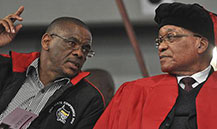 |
Free State Premier Ace Magashule with President Jacob Zuma during the Charlotte Maxeke Memorial Lecture held on the Bloemfontein Campus.
Photo: Stephen Collett
6 August 2012 |
“Mother of African Freedom, heroine, teacher, unifier and true revolutionary.”
That is how dignitaries such as President Jacob Zuma, African Union (AU) Commission Chairperson Dr Nkosazana Dlamini Zuma, Basic Education Minister Angie Motshekga and others described Charlotte Maxeke, the woman they came to celebrate at the University of the Free State on 4 August 2012.
President Zuma honoured the life of the ANC Women’s League stalwart in delivering the fifth annual Charlotte Maxeke Memorial Lecture. The event officially kicked off the national Women’s Month celebrations and thousands of people made their way to the Bloemfontein Campus to listen to the President’s address.
President Zuma told the audience in the Callie Human Centre that women activism had not started with the 1956 march to the Union Buildings – it began much earlier. He spoke about Charlotte Maxeke’s leading role in the landmark 1913 march against pass laws in Bloemfontein and said this had inspired bravery and enthusiasm in the hearts of many in the struggle.
“As a collective, we must emulate the contribution of Mama Maxeke. In her honour, we must continue to open new paths for women, enable them to break new ground in leadership." President Zuma said Charlotte Maxeke, who believed a woman’s place was everywhere, had to be smiling with regard to Dr Dlamini Zuma’s appointment as Chairperson of the AU Commission.
In her speech, Dr Dlamini Zuma encouraged women to embrace the African Decade of Women, saying it was their responsibility to define and implement the changes they want to see. “We should define for ourselves what this decade means, define that we want to do, the role we want to play and achieve during this decade.”